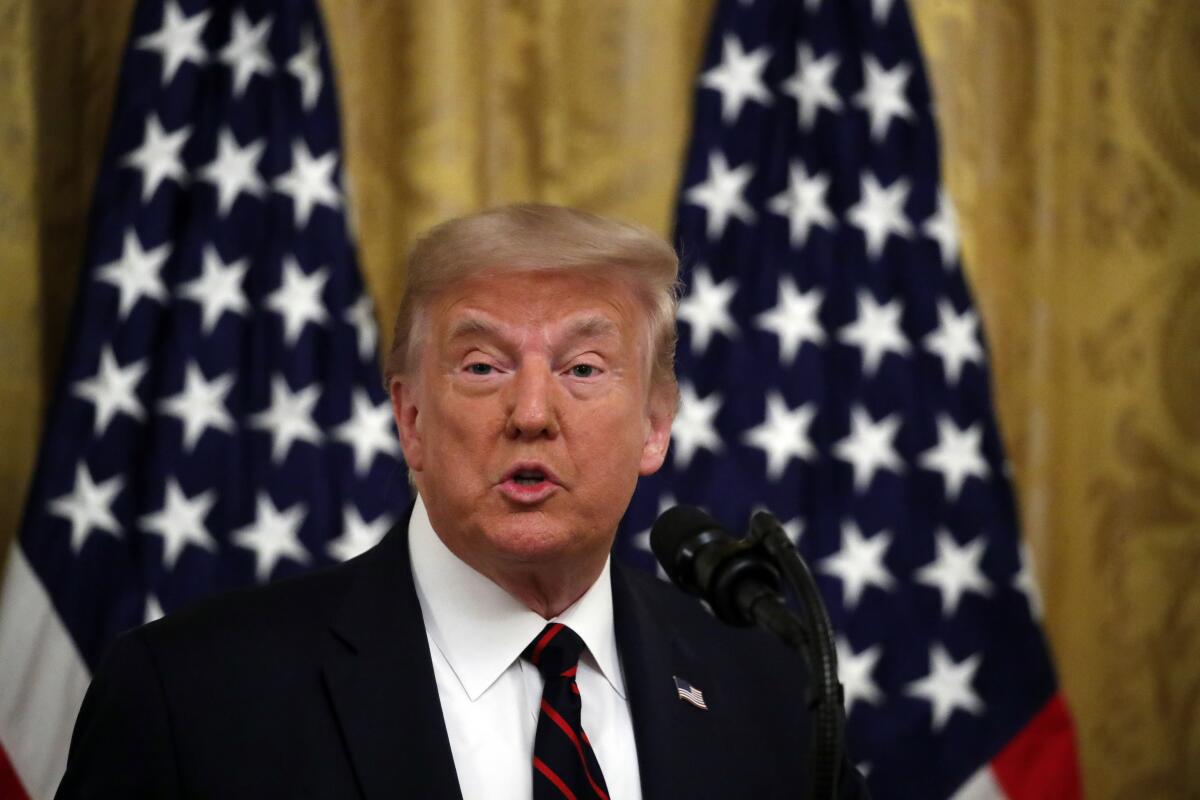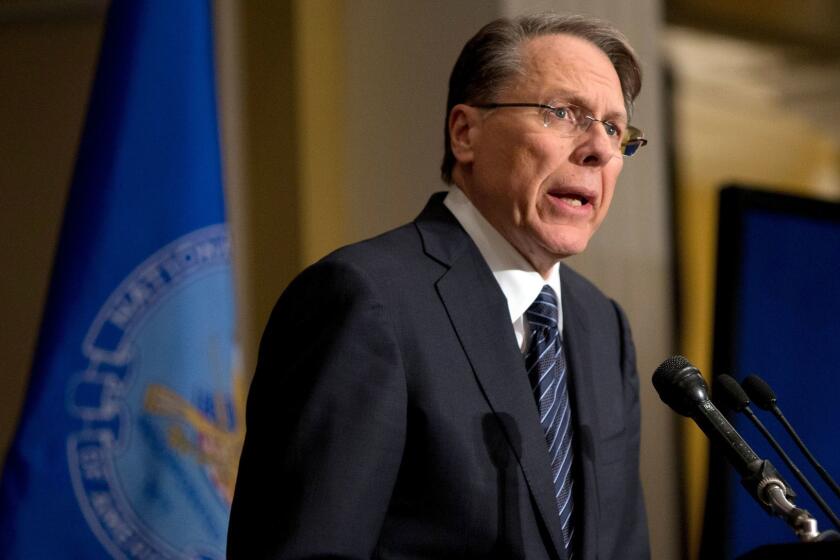Trump’s next executive order could help the jobless, but it’s wrong on so many levels

- Share via
President Trump says he’ll ride to the rescue of jobless Americans if Congress fails to act, telling reporters that he will soon sign an executive order restoring at least some of the extra unemployment benefits that expired at the end of July.
For Democrats, it’s kind of like having an uncle they barely know show up at a family reunion and expect a hug. They would look churlish if they complained about an increase in benefits, and yet having Trump provide it unilaterally would be wrong on a bunch of levels.
As Trump should have learned from the impeachment proceedings, the president doesn’t have the authority just to rewrite how Congress appropriates money. Here, he reportedly wants to finance the extra benefits by redirecting money Congress appropriated in the last big coronavirus relief bill that hasn’t yet been spent. That law, however, provided no such authority.
Beyond that, the problem isn’t the lack of money for the extra benefits program, which provided an additional $600 per week. The Coronavirus Aid, Relief, and Economic Security Act gave it an unlimited amount! But the language passed by Congress and signed into law by Trump ended the program as of July 31, full stop. The program’s demise was written into the statute. Trump can’t wave a wand and change that.
Under Wayne LaPierre’s leadership, the NRA has become a remarkably efficient machine for funneling money into Wayne LaPierre’s pockets.
According to Bloomberg, Trump told reporters that he also planned to order a payroll tax holiday. This idea is championed by conservative economist Stephen Moore, who insisted in a Wall Street Journal opinion piece that Trump had the authority to delay the collection of payroll taxes. The tax would still have to be paid in full, however, when the deferral ended.
For a fundamentally solid business struggling with cash-flow problems caused by the pandemic, such a payroll tax holiday could be helpful if it lasted long enough. But if it were framed as a way to stimulate the economy by giving workers and businesses extra money, that would be dangerous. It’s not extra money; it’s just a loan. The only way it could be a true boost to the economy is if Congress made it a real holiday and suspended the tax, rather than simply delaying its collection.
As with so many things, the root of the problem here is Congress’ inability to strike deals on important issues.
It has been obvious for weeks that the economy isn’t going to quickly rebound to its previous heights after the recession caused by the pandemic. But the Republican-controlled Senate sat on a House-passed sequel to the CARES Act, evidently waiting for the miraculous economic rebound that never came. Senate Majority Leader Mitch McConnell (R-Ky.) finally offered a counterproposal late in July, calling for about $200 per week in added unemployment benefits — after the $600 add-on had already stopped in many states. Now the White House and congressional Democrats are struggling to close the yawning gap between the two sides, with McConnell reportedly confining himself to the sidelines.
(Trump has offered a short-term deal to extend unemployment benefits and a moratorium on evictions from apartments financed by federally backed mortgages, but Democrats don’t want to lift the pressure on the president to bargain on other vital issues, including aid to revenue-starved state and local governments and support for state election systems.)
Granted, some of Trump’s executive actions have come after Congress has refused to do things his way, as on the issue of the southern border wall. But even there, Congress could have defanged the issue of illegal immigration and obviated the need for Trump’s unilateralism had it managed to overhaul the broken U.S. immigration system. Instead, lawmakers have all but thrown up their hands.
It’s worth noting that Trump is surfing on a wave of presidential power grabs that picked up momentum under Presidents Clinton, George W. Bush and Obama as partisan divisions in Congress deepened and lawmakers’ willingness to compromise faded. Although a new study by the American Action Forum has found that Trump has been issuing executive orders and memorandums at a faster pace than any of those presidents, the difference isn’t dramatic — instead, it’s been a pretty consistent escalation.
Democrats who didn’t complain about Obama’s use of executive power because they liked the results — for example, when his administration defied some of the deadlines written into the Affordable Care Act — find themselves in an uncomfortable position now as Trump prepares to help millions of jobless Americans who’ve lost their extra benefits. But you can count on Trump to give Democrats another reason to complain. If he does issue an order extending benefits, he’ll probably provide a lot less than $600 per week.
More to Read
A cure for the common opinion
Get thought-provoking perspectives with our weekly newsletter.
You may occasionally receive promotional content from the Los Angeles Times.











